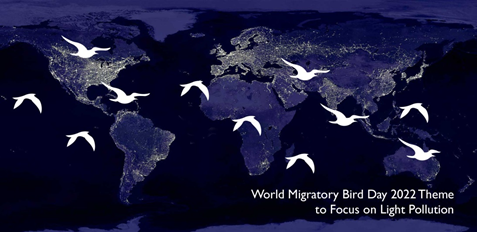

16th May 2022 (7 Topics)
Context
World Migratory Bird Day is celebrated on second Saturday in May and in October.
About
World Migratory Bird Day (WMBD):
- World Migratory Bird Day (WMBD) is an annual awareness-raising campaign highlighting the need for the conservation of migratory birds and their habitats.
- It has a global outreach and is an effective tool to help raise global awareness of the threats faced by migratory birds, their ecological importance, and the need for international cooperation to conserve them.
- Every year people around the world take action and organize public events such as bird festivals, education programmes, exhibitions and bird-watching excursions to celebrate WMBD.
- History:
- The day began in 2006 when the United Nations (UN) decided to raise awareness of migratory birds’ connections between regions worldwide.
- Since then, the event has been held and attended by a total of 118 countries.
- The United Nations Agreement on the Conservation of African-Eurasian Migratory Water birds inspired the creation of World Migratory Bird Day.
- However, the idea of World Migratory Bird Day was conceived in the United States in 1993 when several agencies and organisations started celebrating the day.
- Main days for the international celebrations are on the second Saturday in May and in October.
- World Migratory Bird Day 2022 Theme: Focus on Light Pollution.
- Artificial light is increasing globally by at least 2 per cent per year and it is known to adversely affect many bird species.
- Light pollution is a significant threat to migratory birds, causing disorientation when they fly at night, leading to collisions with buildings, perturbing their internal clocks, or interfering with their ability to undertake long-distance migrations.

Recent findings about migratory birds in India:
- Arctic migrants such as the Pacific Golden Plover and Curlew Sandpiper have seen major declines in the past three decades, potentially due to pronounced effects of climate change in the Arctic.
- The Pacific Golden Plover declined by almost 85-90 per cent in the last 25 years according to the State of India’s Birds report.
- Unforeseen event have a direct impact on migratory birds:
- Last year, the shoreline of wetlands in Andhra Pradesh got inundated with water due to heavy winter rain.
- This led to non-availability of space and food for shorebirds.
- So untimely rainfall, early or late onset of winters have a direct impact on the migration of birds in India.


